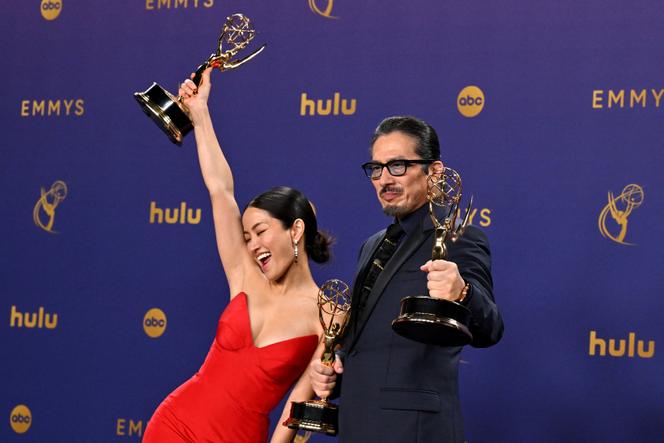


A breath of fresh air blew through the Emmy Awards ceremony, which took place on Sunday, September 15, in Los Angeles, California. After several years dominated by the behemoths Succession and Ted Lasso, the awards honored robust series, while making a few more unexpected choices.
The second award ceremony of the year (after the one in January, which was delayed due to the Hollywood strike) rewarded Shogun, a series mainly shot in Japanese. Produced by the FX channel (owned by Disney), Shogun widens the gap opened by the Korean Squid Game in 2022, by winning four awards, including Best Drama Series, Best Actor and Best Actress. This adds to the 14 trophies received at the separate "technical" Emmy Awards ceremony. This ambitious and meticulous adaptation of a 1970s novel set in feudal Japan made history by becoming the most-awarded series for a single season. It confirmed the trend of the awards opening up to non-English-speaking productions, which is considered an undeniable contribution from streaming platforms.
During the event hosted by the father-son duo Eugene and Dan Levy, who star in the Schitt's Creek series, the series Hacks won the award for Outstanding Comedy. The show explores the thorny relationship between an aging American stand-up star (played by Jean Smart, who has won the Best Comedy Actress award three times) and a young writer tasked with helping her refresh her sketches (Hannah Einbinder). This small HBO Max production beat out The Bear, which has been a favorite since its first season. The abundance of award categories once again highlighted the challenge of categorizing shows, especially with The Bear (funny, but generally rather dark) struggling to find its place alongside pure sitcoms like Abbott Elementary or What We Do in the Shadows.
The Bear (produced by FX like Shogun) was the other big winner of this year's edition, thanks in particular to several acting awards. Jeremy Allen White and Ebon Moss-Bachrach won Best Actor and Best Supporting Actor for the second year running, two categories that didn't see much change this year.
Liza Colon-Zayas took home the award for Best Supporting Actress. Her portrayal of a gruff cook in a standout episode of season 3 resonated with everyone, despite the show being in its second season at the time of the competition.
In the prestigious category of mini-series and anthologies, the Netflix series Baby Reindeer created a surprise. This adaptation of Scotsman Richard Gadd's autobiographical stand-up, which aptly and intelligently recounts the harassment he experienced at the hands of a young woman suffering from psychiatric disorders, took home awards for Best Series, Best Actor and Best Supporting Actress. "If Baby Reindeer has proved anything, it’s that there’s no set formula to this," said Richard Gadd in his acceptance speech. "You don't need big stars, proven IP, long-running series, catchall storytelling to have a hit. Really the only constant across any success in television is good storytelling."
